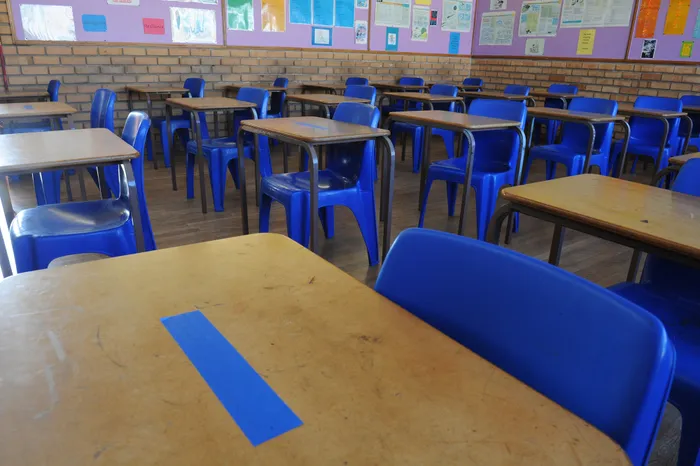
From private schools to township classrooms, teachers are facing a surge of abuse from parents who bypass formal channels and confront staff directly.
Image: Independent Media archives
When parents attack, teachers pay the price.
Across schools, parents are bypassing principals, confronting staff, and escalating disputes over grades, sports, and discipline. Many educators say the abuse is driving them out of the profession.
The way this aggression plays out differs between private and public schools. In private schools, parents often use their financial clout to demand outcomes, challenging teachers over even minor decisions. In public schools, confrontations are more likely to stem from frustration with broader social and educational pressures, but the result is the same: teachers face intimidation, verbal abuse, and, in some cases, threats to their safety.
Thirona Moodley of the teachers’ union Naptosa says the situation is unbearable. “Parents are stepping out of their lanes and engaging with the school on issues that are out of their mandate. They come in like bulldozers…” she says.
Many parents, she says, are bypassing formal channels. Rather than lodging complaints with principals or school governing bodies, they evade security and go straight into classrooms, leaving teachers fearful and occasionally in danger. “Children are very active in making false accusations, and then the parents respond. They support their children and don’t want to hear negative comments or reports about their conduct.”
The aggression spans both public and private schools, though it takes different forms. “In private schools, parents tend to be more hands‑on and more critical of teachers. Even small issues, like where a child is asked to sit, can become a problem. Some feel entitled because they pay high school fees and believe they deserve to demand accountability from teachers.”
Andrè De Bruyn, from the Education & Allied Workers Union of South Africa (EUSA), says that apart from parental aggression, teachers also face aggression from pupils and community members. “This violence and intimidation erode morale, crush mental health, and drive teachers away from the profession, especially in poorer public schools that are already under‑resourced and overstretched.”
Earlier this week, a teacher at a former model‑C school in Cape Town recalled being confronted by a parent after a child failed to make the sports team. “Instead of messaging me, she took her frustrations straight to the principal but fabricated more lies. If she messaged me, I would tell her what happened,” she said. The situation escalated when the parent spread her version of events in a parents’ WhatsApp group.
Another public school teacher said the problem is compounded in poorer communities, where young parents are often aggressive towards teachers, unlike past times when parents would first ask what the child had done wrong. “Now you get the mom who sends you a message that she will be waiting for you after school, without even questioning what their child did,” she warned.
A Durban teacher recalls how a parent burst into their staffroom during a meeting and punched the principal in the face, breaking his nose. The incident was believed to be related to her daughter’s homework.
This week, two Johannesburg school governing body (SGB) members who wished to remain anonymous said their daily battles go far beyond the usual challenges of teaching. One recounted how two boys were caught smoking dagga at school. “One of the boys was so aggressive that his own mother was scared of him. You could see that she had tried everything, but he had no respect for anyone. He ended up leaving school.”
Andre Oosthuysen, executive head of St Benedict’s, says this confrontational approach now spans a wide spectrum of issues - from discipline and academic results to sports awards. He says school leaders are facing growing numbers of “keyboard warrior” parents — mothers and fathers who bypass dialogue and instead resort to legal threats, media pressure, or political interference over even the smallest of issues.
Professor Nuraan Davids of the University of Stellenbosch lectures in Educational Philosophy and has noticed a growing trend: education is being viewed as a transactional investment. “Parents expect a return: that their child will succeed academically, gain university entry, or excel in extracurricular activities. Because they are paying, directly or indirectly they feel entitled to intervene in school matters, much like supervising a hired painter.”
Social media, Davids says, only intensifies these pressures. “An incident in a class at 10am can be tweeted, filmed, and shared before emotions have settled. By the time the child gets home, the parent may have emailed the teacher or lodged a complaint. Teachers often have no time to calm the situation before it escalates.”
Terrence Khala from the Department of Basic Education revealed that while corporal punishment remains one of the most frequently reported forms of teacher misconduct, the department is not aware of any widespread litigation by parents. “The Department is taking a firm stance to eliminate corporal punishment through strengthened enforcement, teacher training, and awareness campaigns to protect learners’ rights and reduce potential conflict between parents and educators,” Khala said.
He also offered reassurance regarding concerns about teacher shortages. “South Africa has a large pool of qualified, unemployed educators, and we are actively working to place them where they are needed most. Any shortages that do arise are subject‑ or phase‑specific, and targeted interventions, including recruitment drives, bursary programmes, and improved deployment systems, are being implemented to ensure that every classroom is adequately staffed,” said Khala.
Related Topics: